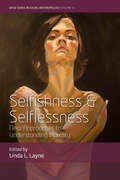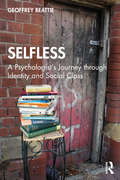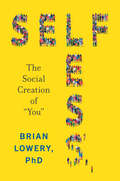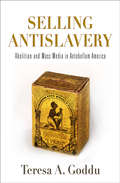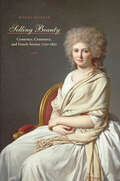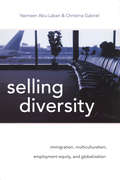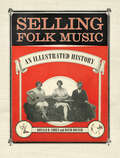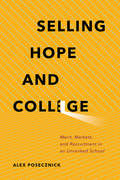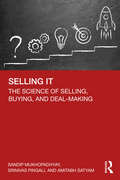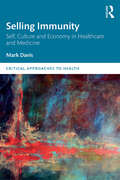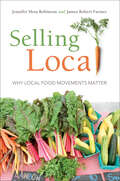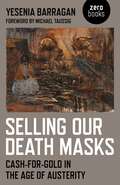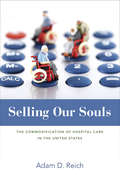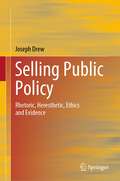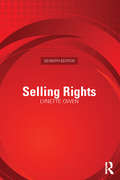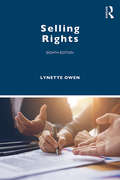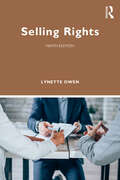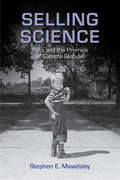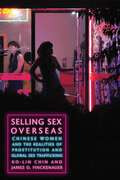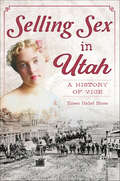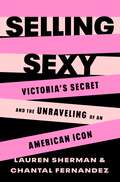- Table View
- List View
Selfish Women
by Lisa DowningThis book proceeds from a single and very simple observation: throughout history, and up to the present, women have received a clear message that we are not supposed to prioritize ourselves. Indeed, the whole question of "self" is a problem for women – and a problem that issues from a wide range of locations, including, in some cases, feminism itself. When women espouse discourses of self-interest, self-regard, and selfishness, they become illegible. This is complicated by the commodification of the self in the recent Western mode of economic and political organization known as "neoliberalism," which encourages a focus on self-fashioning that may not be identical with self-regard or self-interest. Drawing on figures from French, US, and UK contexts, including Rachilde, Ayn Rand, Margaret Thatcher, and Lionel Shriver, and examining discourses from psychiatry, media, and feminism with the aim of reading against the grain of multiple orthodoxies, this book asks how revisiting the words and works of selfish women of modernity can assist us in understanding our fraught individual and collective identities as women in contemporary culture. And can women with politics that are contrary to the interests of the collective teach us anything about the value of rethinking the role of the individual? This book is an essential read for those with interests in cultural theory, feminist theory, and gender politics.
Selfishness and Selflessness: New Approaches to Understanding Morality (WYSE Series in Social Anthropology #10)
by Linda L. LayneWe are said to be suffering a narcissism epidemic when the need for collective action seems more pressing than ever. Selfishness and selflessness address the ‘proper’ and ‘improper’ relationship between one’s self and others. The work they do during periods of social instability and cultural change is probed in this original, interdisciplinary collection. Contributions range from an examination of how these concepts animated the eighteenth-century anti-slavery campaigners to dissecting the way middle-class mothers’ experiences illustrate gendered struggles over how much and to whom one is morally obliged to give.
Selfishness and Selflessness: New Approaches to Understanding Morality (WYSE Series in Social Anthropology #10)
by Linda L. LayneWe are said to be suffering a narcissism epidemic when the need for collective action seems more pressing than ever. The traits of Selfishness and selflessness address the ‘proper’ and ‘improper’ relationship between one’s self and others. The work they do during periods of social instability and cultural change is probed in this original, interdisciplinary collection. Contributions range from an examination of how these concepts animated the eighteenth-century anti-slavery campaigners to a dissection of the way middle-class mothers’ experiences illustrate gendered struggles over how much and to whom one is morally obliged to give.
Selfless: A Psychologist's Journey Through Identity And Social Class
by Geoffrey BeattieSelfless is a memoir, reflecting on identity, social class, mobility, education, and on psychology itself; how psychology as a discipline is conducted, how it prioritises objects of study, how it uncovers psychological truths about the world. Geoffrey Beattie takes the reader on a journey through his early life in working-class Belfast, his Ph.D. at Trinity College Cambridge and subsequent academic and professional career, to explore fundamental issues within psychology about social class and social identity. Beattie discusses the difficulties inherent in this process of education and change, and how social background affects how you view academic work and the subject matter of one’s discipline. This book movingly details a life and how it is changed by the processes of education, the psychological pressures when abandoning those close to you, the dissonance within and how it feels and operates. The book takes a critical look at psychology from the other side, and examines the process of becoming ‘selfless’, meaning having little sense of self rather than being overly concerned with the wishes and needs of others. Showing how our early experiences and their influence continues throughout life, Beattie’s emotionally engaging, entertaining, and witty text offers general readers, students, and academics fresh insights into psychology, adaptation and personal change.
Selfless: The Social Creation of “You”
by Brian LowerySocial psychologist and Stanford professor Brian Lowery presents a provocative, powerful theory of identity, arguing that there is no essential "self"—our selves are social creations of those with whom we interact —exploring what that means for who we can be and who we allow others to be. There’s nothing we spend more time with, but understand less, than ourselves. You’ve been with yourself every waking moment of your life. But who—or, rather, what—are you? In Selfless, Brian Lowery argues for the radical idea that the “self” as we know it—that “voice in your head”—is a social construct, created in our relationships and social interactions. We are unique because our individual pattern of relationships is unique. We change because our relationships change. Your self isn’t just you, it’s all around you.Lowery uses this research-driven perspective of selfhood to explore questions of inequity, race, gender, politics, and power structures, transforming our perceptions of how the world is and how it could be. His theory offers insight into how powerful people manage their environment in sophisticated, often unconscious, ways to maintain the status quo; explains our competing drives for deep social connection and personal freedom; and answers profound, personal questions such as: Why has my sense of self evolved over time? Why do I sometimes stop short of changes that I want to make in life? In Selfless, Lowery persuasively breaks down common assumptions and beliefs; his insights are humbling. Despite what many may think, we aren’t islands unto ourselves; we are the creation of the many hands that touch us. We don’t just exist in communities, we are created and shaped by them. Our highs and lows are not only our own but belong to others as well. By recognizing that we are products of relationships—from fleeting transactions to deep associations—we shatter the myth of individualism and free ourselves to make our lives and the world accordingly.
Selling Antislavery: Abolition and Mass Media in Antebellum America (Material Texts)
by Teresa A. GodduA richly illustrated history of the American Anti-Slavery Society and its print, material, and visual artifactsBeginning with its establishment in the early 1830s, the American Anti-Slavery Society (AASS) recognized the need to reach and consolidate a diverse and increasingly segmented audience. To do so, it produced a wide array of print, material, and visual media: almanacs and slave narratives, pincushions and gift books, broadsides and panoramas. Building on the distinctive practices of British antislavery and evangelical reform movements, the AASS utilized innovative business strategies to market its productions and developed a centralized distribution system to circulate them widely. In Selling Antislavery, Teresa A. Goddu shows how the AASS operated at the forefront of a new culture industry and, by framing its media as cultural commodities, made antislavery sentiments an integral part of an emerging middle-class identity. She contends that, although the AASS's dominance waned after 1840 as the organization splintered, it nevertheless created one of the first national mass markets.Goddu maps this extensive media culture, focusing in particular on the material produced by AASS in the decade of the 1830s. She considers how the dissemination of its texts, objects, and tactics was facilitated by the quasi-corporate and centralized character of the organization during this period and demonstrates how its institutional presence remained important to the progress of the larger movement. Exploring antislavery's vast archive and explicating its messages, she emphasizes both the discursive and material aspects of antislavery's appeal, providing a richly textured history of the movement through its artifacts and the modes of circulation it put into place.Featuring more than seventy-five illustrations, Selling Antislavery offers a thorough case study of the role of reform movements in the rise of mass media and argues for abolition's central importance to the shaping of antebellum middle-class culture.
Selling Beauty: Cosmetics, Commerce, and French Society, 1750–1830 (The Johns Hopkins University Studies in Historical and Political Science #127)
by Morag MartinMorag Martin’s history of the cosmetic industry in France examines the evolution of popular tastes and standards of beauty during the late 18th and early 19th centuries. As the French citizenry rebelled against the excesses of the aristocracy, there was a parallel shift in consumer beauty practices. Powdered wigs, alabaster white skin, and rouged cheeks disappeared in favor of a more natural and simple style. Selling Beauty challenges expectations about past fashions and offers a unique look into consumer culture and business practices. Martin introduces readers to the social and economic world of cosmetic production and consumption, recounts criticisms against the use of cosmetics from a variety of voices, and examines how producers and retailers responded to quickly evolving fashions.Martin shows that the survival of the industry depended on its ability to find customers among the emerging working and middle classes. But the newfound popularity of cosmetics raised serious questions. Critics—from radical philosophes to medical professionals—complained that the use of cosmetics was a threat to social morals and questioned the healthfulness of products that contained arsenic, mercury, and lead. Cosmetic producers embraced these withering criticisms, though, skillfully addressing these concerns in their marketing campaigns, reassuring consumers of the moral and physical safety of their products. Rather than disappearing along with the Old Regime, the commerce of cosmetics, reimagined and redefined, flourished in the early 19th century, as political ideals and Enlightenment philosophies radically altered popular sentiment.
Selling Diversity: Immigration, Multiculturalism, Employment Equity, And Globalization
by Yasmeen Abu-Laban Christina GabrielSince the 1990s, Canadian policy prescriptions for immigration, multiculturalism, and employment equity have equated globalization with global markets. This interpretation has transformed men and women of various ethnic backgrounds into trade-enhancing commodities who must justify their skills and talents in the language of business. This particular neo-liberal reading of globalization and public policy has resulted in a trend the authors call selling diversity. Using gender, race/ethnicity, and class lenses to frame their analysis, the authors review Canadian immigration, multiculturalism, and employment equity policies, including their different historical origins, to illustrate how a preference for selling diversity has emerged in the last decade. In the process they suggest that a commitment to enhance justice in a diverse society and world has been muted. Yet, neo-liberalism is not the only or inevitable option in this era of globalization, and Canadians are engaging in transnational struggles for rights and equality and thereby increasing the interconnectedness between peoples across the globe. Consequently, the emphasis on selling diversity might be challenged.
Selling Ethnic Neighborhoods: The Rise of Neighborhoods as Places of Leisure and Consumption (Routledge Advances in Geography)
by Jan Rath Volkan AytarWhile ethnic neighborhoods are usually associated with poverty, crime and social problems, they have also emerged as places of leisure and consumption, providing opportunities for numerous entrepreneurs and employees. Local and national governments and other regulatory actors, as well as the media, have started to see and promote these neighborhoods as urban attractions for tourists, city dwellers and others. This book aims to analyze the roles of ethnic entrepreneurs and their associations and governments, and - by extension - of consumers and other actors in the rise of ethnic neighborhoods as places of leisure and consumption. Through case studies, it situates those neighborhoods at the edge of different theoretical debates about urban political economy and the politics of culture, and seeks a dynamic synergy between both.
Selling Folk Music: An Illustrated History (American Made Music Series)
by Ronald D. Cohen David BonnerSelling Folk Music: An Illustrated History highlights commercial sources that reveal how folk music has been packaged and sold to a broad, shifting audience in the United States. Folk music has a varied and complex scope and lineage, including the blues, minstrel tunes, Victorian parlor songs, spirituals and gospel tunes, country and western songs, sea shanties, labor and political songs, calypsos, pop folk, folk-rock, ethnic, bluegrass, and more. The genre is of major importance in the broader spectrum of American music, and it is easy to understand why folk music has been marketed as America's music. Selling Folk Music presents the public face of folk music in the United States via its commercial promotion and presentation throughout the twentieth century. Included are concert flyers; sheet music; book, songbook, magazine, and album covers; concert posters and flyers; and movie lobby cards and posters, all in their original colors. The 1964 hootenanny craze, for example, spawned such items as a candy bar, pinball machine, bath powder, paper dolls, Halloween costumes, and beach towels. The almost five hundred images in Selling Folk Music present a new way to catalog the history of folk music while highlighting the transformative nature of the genre. Following the detailed introduction on the history of folk music, illustrations from commercial products make up the bulk of the work, presenting a colorful, complex history.
Selling Hope and College: Merit, Markets, and Recruitment in an Unranked School
by Alex PosecznickIt has long been assumed that college admission should be a simple matter of sorting students according to merit, with the best heading off to the Ivy League and highly ranked liberal arts colleges and the rest falling naturally into their rightful places. Admission to selective institutions, where extremely fine distinctions are made, is characterized by heated public debates about whether standardized exams, high school transcripts, essays, recommendation letters, or interviews best indicate which prospective students are "worthy."And then there is college for everyone else. But what goes into less-selective college admissions in an era when everyone feels compelled to go, regardless of preparation or life goals? "Ravenwood College," where Alex Posecznick spent a year doing ethnographic research, was a small, private, nonprofit institution dedicated to social justice and serving traditionally underprepared students from underrepresented minority groups. To survive in the higher education marketplace, the college had to operate like a business and negotiate complex categories of merit while painting a hopeful picture of the future for its applicants. Selling Hope and College is a snapshot of a particular type of institution as it goes about the business of producing itself and justifying its place in the market. Admissions staff members were burdened by low enrollments and worked tirelessly to fill empty seats, even as they held on to the institution’s special spirit. Posecznick documents what it takes to keep a "mediocre" institution open and running, and the struggles, tensions, and battles that members of the community tangle with daily as they carefully walk the line between empowering marginalized students and exploiting them.
Selling IT: The Science of Selling, Buying, and Deal-Making
by Amitabh Satyam Sandip Mukhopadhyay Srinivas PingaliInformation technology (IT) is an essential core of the economy today. Corporations and governments worldwide rely on it to drive their core strategy and develop and execute business models. Amounting to over 3.7 trillion US dollars of worldwide spending, the growing significance of the IT industry in the global economy is now well established. Hence, it is crucial to understand the marketplace within which it exists, and this book presents a systematic analysis of the processes, techniques, and methods involved in IT sales and marketing. In Selling IT, the book: Integrates a large IT provider’s selling process with the enterprise user’s IT buying process to highlight the nuances of selling, marketing, and developing IT solutions that create value for customers. Discusses various key concepts such as value-based IT selling, business case for IT acquisition, vendor evaluation and management, account and customer relationship management, customer segmentation, and techniques for customer acquisition and retention. Analyses the challenges and opportunities involved in selling digital IT and examines the evolution of jobs and careers based on the changed IT landscape. Includes lesson plans, case studies, and chapter-wise practice questions to support teaching and learning. The book boasts a robust theoretical foundation supported by a clear exposition of concepts and management theories. It will be of benefit to professionals using organisation-mandated selling processes. Young executives with a technology background looking for a sales and marketing career in the IT industry can also effectively use this book. It will also be an essential read for scholars and researchers in B2B marketing, IT consulting, technology sales, and digital transformation.
Selling Immunity Self, Culture and Economy in Healthcare and Medicine (Critical Approaches to Health)
by Mark DavisSelling Immunity: Self, Culture and Economy in Healthcare and Medicine provides a groundbreaking study of the ways in which immunity shapes life. Through its up-to-date discussion of immunity cultures, alongside detailed real-world examples, the book demonstrates how immunity is enmeshed in concepts of possessive individualism, self-defence and health consumerism. The book explores the rich metaphorical powers of immunity and the life narratives it inspires with reference to the talk of scientists, immunology texts and popular science magazines. The author provides a detailed overview of the ways in which digital media can shape the immune self with reference to cultural and social theories, providing insight into how immunitary knowledge and products are consumed and the benefits and drawbacks this has for healthcare. The book considers the significance of immunity for individuals navigating the threats to health that arise with pandemics and superbugs, with a keen look into how these ideas surface in everyday life across the globe. Finally, the book also discusses economic bases of healthcare technologies bent towards the protection and restoration of immunity. This book is essential reading for professionals within the fields of psychology, sociology, biomedical science, healthcare and other related disciplines. A broader audience will appreciate the book’s attention on the ways immunity is understood to be a personal possession, an object of life craft, and the basis for healthcare consumerism.
Selling Local: Why Local Food Movements Matter
by James Robert Farmer Jennifer Meta RobinsonIn an era bustling with international trade and people on the move, why has local food become increasingly important? How does a community benefit from growing and buying its own produce, rather than eating food sown and harvested by outsiders? Selling Local is an indispensable guide to community-based food movements, showcasing the broad appeal and impact of farmers’ markets, community supported agriculture programs, and food hubs, which combine produce from small farms into quantities large enough for institutions like schools and restaurants. After decades of wanting food in greater quantities, cheaper, and standardized, Americans now increasingly look for quality and crafting. Grocery giants have responded by offering "simple" and "organic" food displayed in folksy crates with seals of organizational approval, while only blocks away a farmer may drop his tailgate on a pickup full of freshly picked sweet corn. At the same time, easy-up umbrellas are likely to unfurl over multi-generational farmers’ markets once or twice a week in any given city or town. Drawing on prodigious fieldwork and research, experts Jennifer Meta Robinson and James Robert Farmer unlock the passion for and promise of local food movements, show us how they unfold practically in towns and on farms, and make a persuasive argument for how much they deeply matter to all of us.
Selling Our Death Masks: Cash-For-Gold in the Age of Austerity
by Yesenia BarraganA radical historical ethnography on the meaning of a fundamentally new physical landscape of our age of austerity: cash-for-gold shops that numerically exploded in the wake of the worst economic crisis of our times.
Selling Our Souls: The Commodification of Hospital Care in the United States
by Adam Dalton ReichHealth care costs make up nearly a fifth of U.S. gross domestic product, but health care is a peculiar thing to buy and sell. Both a scarce resource and a basic need, it involves physical and emotional vulnerability and at the same time it operates as big business. Patients have little choice but to trust those who provide them care, but even those providers confront a great deal of medical uncertainty about the services they offer. Selling Our Souls looks at the contradictions inherent in one particular health care market—hospital care. Based on extensive interviews and observations across the three hospitals of one California city, the book explores the tensions embedded in the market for hospital care, how different hospitals manage these tensions, the historical trajectories driving disparities in contemporary hospital practice, and the perils and possibilities of various models of care.As Adam Reich shows, the book's three featured hospitals could not be more different in background or contemporary practice. PubliCare was founded in the late nineteenth century as an almshouse in order to address the needs of the destitute. HolyCare was founded by an order of nuns in the mid-twentieth century, offering spiritual comfort to the paying patient. And GroupCare was founded in the late twentieth century to rationalize and economize care for middle-class patients and their employers. Reich explains how these legacies play out today in terms of the hospitals' different responses to similar market pressures, and the varieties of care that result.Selling Our Souls is an in-depth investigation into how hospital organizations and the people who work in them make sense of and respond to the modern health care market.
Selling Public Policy: Rhetoric, Heresthetic, Ethics and Evidence
by Joseph DrewProfessor Drew’s latest work makes the case that even great public policy needs to be deliberately and strategically sold in order for it to ultimately be considered a success. However, it seems that most people charged with the task of selling public policy simply do not have the requisite skills to do so.Selling public policy is an art that draws on disparate strands of scholarship spanning the political sciences, economics, sociology, ethics and the classics. To perform the art of selling public policy one must first master the lessons from the greats in the field. Following this, it is necessary to learn how to apply the knowledge to real-world complex scenarios in such a way that the policy is indeed sold and stays sold over the implied returns period.This book is unique in the corpus of scholarly literature because it provides both the knowledge and real-world case studies required for students, scholars, and policy practitioners to master the art of selling public policy.
Selling Rights
by Lynette OwenSelling Rights has firmly established itself as the leading guide to all aspects of rights sales and co-publications throughout the world. The seventh edition is substantially updated to illustrate the changes in rights in relation to new technologies and legal developments in the United Kingdom and the rest of the world. This fully revised and updated edition includes: coverage of the full range of potential rights from English-language territorial rights through to serial rights, permissions, rights for the reading-impaired, translation rights, dramatization and documentary rights, electronic and multimedia rights More detailed coverage of Creative Commons and Open Access The aftermath of the Digital Economy Act 2010, the Hooper Report and new UK Statutory Instruments affecting copyright Updated coverage of book fairs The implications of adding e-book rights to print licences A separate chapter on collective licensing via Reproduction Rights Organizations The impact of new electronic hardware (e-readers, tablets, mobile phones) – the distinction between sales and licences the rights implications of acquisitions, mergers and disposals updates on serial rights, including online New appendices listing territories normally sought as exclusive by UK publishers and a glossary of rights specific terms. Selling Rights is an essential reference tool and an accessible and illuminating guide to current and future issues for rights professionals and students of publishing.
Selling Rights
by Lynette OwenSelling Rights has firmly established itself as the leading guide to all aspects of rights sales and co-publications throughout the world. The eighth edition is substantially updated to illustrate the changes in rights in relation to new technologies and legal developments in the United Kingdom and the rest of the world. This fully revised and updated edition includes: • coverage of the full range of potential rights from English-language territorial rights through to serial rights, permissions, rights for the reading impaired, translation rights, dramatization and documentary rights, electronic and multimedia rights • more detailed coverage of Open Access • the aftermath of recent reviews and revisions to copyright in the UK and elsewhere • updated coverage of book fairs • a major update of the chapter on audio rights • an updated chapter on collective licensing via Reproduction Rights Organizations • the impact of new electronic hardware (e-readers, tablets, smartphones) – the distinction between sales and licences • the rights implications of acquisitions, mergers and disposals • updates on serial rights • new appendices listing countries belonging to the international copyright conventions and absentee countries Selling Rights is an essential reference tool and an accessible and illuminating guide to current and future issues for rights professionals and students of publishing.
Selling Rights
by Lynette OwenNow in its ninth edition, Selling Rights has firmly established itself as the leading guide to all aspects of rights sales and co-publications throughout the world.Covering the full range of potential rights, from English-language territorial rights through to serial rights, permissions, rights for the reading-impaired, translation rights, dramatization and documentary rights, electronic and multimedia rights, this book constitutes a comprehensive introduction and companion to the topic. Besides individual types of rights, topics covered also include book fairs, Open Access, the ongoing impact of new electronic hardware, and the rights implications of acquisitions, mergers, and disposals.This fully updated edition includes:• New IP legislation and proposed legislation in the UK and the USA, including changes regarding TDM and the post-Brexit implications of EU directives and exhaustion of rights.• The implications of artificial intelligence (AI) for author contracts and licensing contracts.• The impact of the pandemic and its aftermath on the promotion and sale of rights.• Coverage of censorship in countries around the world, especially in relation to LGBTQI+ content, as well as political situations which have impacted on rights trading.• The impact of streaming services on opportunities for licensing television and film rights.• Major revisions to the chapters on audio and video recording rights, the internet and publishing, and electronic publishing and digital licensing.Selling Rights is an essential reference tool and an accessible and illuminating guide to current and future issues for rights professionals and students of publishing.
Selling Science: Polio and the Promise of Gamma Globulin
by Stephen E. MawdsleyToday, when many parents seem reluctant to have their children vaccinated, even with long proven medications, the Salk vaccine trial, which enrolled millions of healthy children to test an unproven medical intervention, seems nothing short of astonishing. In Selling Science, medical historian Stephen E. Mawdsley recounts the untold story of the first large clinical trial to control polio using healthy children--55,000 healthy children--revealing how this long-forgotten incident cleared the path for Salk's later trial. Mawdsley describes how, in the early 1950s, Dr. William Hammon and the National Foundation for Infantile Paralysis launched a pioneering medical experiment on a previously untried scale. Conducted on over 55,000 healthy children in Texas, Utah, Iowa, and Nebraska, this landmark study assessed the safety and effectiveness of a blood component, gamma globulin, to prevent paralytic polio. The value of the proposed experiment was questioned by many prominent health professionals as it harbored potential health risks, but as Mawdsley points out, compromise and coercion moved it forward. And though the trial returned dubious results, it was presented to the public as a triumph and used to justify a federally sanctioned mass immunization study on thousands of families between 1953 and 1954. Indeed, the concept, conduct, and outcome of the GG study were sold to health professionals, medical researchers, and the public at each stage. At a time when most Americans trusted scientists, their mutual encounter under the auspices of conquering disease was shaped by politics, marketing, and at times, deception. Drawing on oral history interviews, medical journals, newspapers, meeting minutes, and private institutional records, Selling Science sheds light on the ethics of scientific conduct, and on the power of marketing to shape public opinion about medical experimentation.
Selling Security
by Alison WakefieldIn recent years there has been massively increased demand for the services of the private security industry, which has now assumed a far greater role in policing areas that were once the sphere of the police --for example, shopping malls, leisure parks and transportation terminals. This book provides a detailed account of the developments in urban planning, public policy and the commercial world which have promoted the development of private security, and provides a unique examination of security teams in operation in three very different environments --a shopping mall, a retail and leisure complex, and an arts centre. The study is set within a broader context that considers changes in retail and leisure patterns that have promoted the development of large, multi-purpose developments, shifts in town centre planning to create more secure high street retail and leisure facilities, and the promotion of CCTV and security patrols. Finally, the book considers the ethical issues that arise with the massively increased use of private security, and the broader policy issues which arise.
Selling Sex Overseas: Chinese Women and the Realities of Prostitution and Global Sex Trafficking
by Ko-lin Chin James O. Finckenauer2013 Outstanding Book Award Winner from the Division of International Criminology, American Society of CriminologyEvery year, thousands of Chinese women travel to Asia and the United States in order to engage in commercial sex work. In Selling Sex Overseas, Ko-lin Chin and James Finckenauer challenge the current sex trafficking paradigm that considers all sex workers as victims, or sexual slaves, and as unwilling participants in the world of commercial sex. Bringing to life an on-the-ground portrait of this usually hidden world, Chin and Finckenauer provide a detailed look at all of its participants: sex workers, pimps, agents, mommies, escort agency owners, brothel owners, and drivers. Ultimately, they probe the social, economic, and political organization of prostitution and sex trafficking, contradicting many of the ‘moral crusaders’ of the human trafficking world.
Selling Sex in Utah: A History of Vice (The History Press)
by Eileen Hallet StoneUncovering Sin, Scandal and Sensuality In the late 1840s, the new frontier west of the Missouri River opened its floodgates to opportunity and adventure. In a new land, where men were lonely and women scarce, prostitutes poured in to ply their trade wherever they could--under trees, in wagons or random shanties. Within decades, prostitution expanded into cities and towns. Red light districts, brothels and cribs sprouted like wildflowers. Ogden's notorious madam Belle London enticed Salt Lake Councilmen to hire her to oversee their one hundred fifty room crib stockade. Park City's Mother Urban successfully defended her sixteen row houses as "necessities" for thousands of miners. The ballyhooed brothels of Helper stimulated "hunting trips" for Salt Lake men willing to travel for sex. Award-winning author Eileen Hallet Stone combed newspapers, archives and court cases to examine the lives, equity and infamy of Utah prostitution.
Selling Sexy: Victoria’s Secret and the Unraveling of an American Icon
by Lauren Sherman Chantal FernandezThe story of how Victoria’s Secret skyrocketed from a tiny chain of boutiques to a retail phenomenon with more than $8 billion in annual sales at its peak—all while defining an impossible beauty standard for generations of American women—before the brand’s tight grip on the industry finally slippedVictoria’s Secret is one of the most influential and polarizing brands to ever infiltrate the psyche of the American consumer. Almost right at its start in the late 1970s, the company developed a cult following for its glamorous catalogs. Back then, shoppers had few alternatives to the stodgy department stores that sold most of the nation’s intimate apparel. By 1982, the founders of Victoria’s Secret avoided bankruptcy by selling to Les Wexner, the fast-fashion pioneer behind the Limited, whose empire of mall brands would go on to dominate American retail for forty years.Wexner turned Victoria’s Secret into a multibillion-dollar business, and the brand’s cultural influence soared thanks to its airbrushed advertisements and annual televised fashion show, which drew millions of viewers each year. Its supermodel spokeswomen, the sweet but sultry Angels, personified a new American beauty standard.But as our definition of beauty expanded, Victoria’s Secret failed to evolve and reached a crisis point. Meanwhile, Wexner became increasingly known for his complicated relationship with sex trafficker Jeffrey Epstein, his former financial adviser and confidant.Selling Sexy expertly draws from sources within Victoria’s Secret and across the industry to examine the unprecedented rise of one of the most innovative brands in retail history—a brand that today, under new ownership, is desperately trying to seduce shoppers again.

